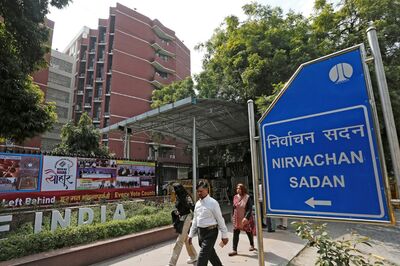
views
Realtors body NAREDCO on Tuesday demanded that the new government should bring policy reforms for growth in the real estate sector and provide tax incentives to home buyers as well as developers to boost housing demand.
The association also sought streamlining of getting approvals to develop projects.
Also Read: Will Indian Real Estate Sector Fulfill The Promise Of Viksit Bharat?
Reacting to the results of the Lok Sabha elections 2024, G Hari Babu, NAREDCO national president, said, “The real estate sector is at a crucial point, with great growth potential but significant challenges. To reach a market size of USD 1 trillion by 2030 and become a net-zero carbon industry by 2047, we need government support.”
Addressing rising home loan EMIs, implementing key policy reforms, and introducing sustainability incentives are essential, he said.
Additionally, making affordable housing more accessible by adjusting financial limits and providing incentives for builders is critical for the progress, Babu said.
Home Loan EMI
“We are seeking specific actions from the government to address the rising home loan EMIs and interest rates. The increase from 6.25 per cent before COVID-19 to around 8.75 per cent today has made monthly EMIs very expensive, particularly for middle-class families. We urge the government to provide relief by offering lower interest rates for affordable housing loans.”
“This can be achieved by setting the first Rs 20 lakh or Rs 25 lakh of a home loan at a 5 per cent interest rate for the first five years,” the NAREDCO President said.
Babu said specific policy reforms are necessary to stimulate growth in the real estate sector, particularly in affordable housing.
“We expect the government to implement policy reforms and incentives to support the growth and sustainability of the real estate sector. These reforms could include financial incentives for sustainable building practices and subsidies or tax breaks for developers who focus on affordable housing projects,” he said.
Babu felt that easing regulatory constraints and streamlining approval processes would further boost the sector’s growth.
Anarock chairman Anuj Puri said, ”A stable government with a strong focus on development and increased expenditure to build assets reinforces the confidence of global investors who are hoping for a wider spread of options in India. Simultaneously, a strong opposition is always supportive of a vibrant democracy.”
Need For Effective Tax Deductions
Samir Jasuja, CEO and MD of real estate data firm PropEquity, pointed out that real estate prices have surged in recent years, nearly doubling in the last four years.
On the contrary, he said, tax deductions offered on home loans haven’t kept pace. In effect, the benefit of these deductions has been halved taking into account the rising property values.
“To achieve the government objective of USD 1 trillion real estate industry, reforms are needed to incentivise both buyers and investors,” Jasuja added.
Pradeep Aggarwal, founder & chairman, Signature Global (India), said the infrastructure sector along with the real estate sector is key for achieving the goal of ‘Vikshit Bharat’.
“We are confident that the new government will continue its focus on both infrastructure development beyond metro and large cities and on the real estate sector, as they have a multiplier effect on the economy,” he said.
Aggarwal hoped that the new government would extend the income tax benefits on home loans in the new income tax regulations as well.
“We also expect the new government to address some of the challenges faced by these sectors and take the lead in convincing the GST Council to ease the burden of Goods and Services Tax (GST) on both developers and consumers,” he said.
Political Stability Enhances Confidence Among Both Consumers and Investors
Amit Goyal, MD, India Sotheby’s International Realty, said that the return of an existing government to power positively impacts the Indian economy and the real estate sector. Political stability significantly enhances confidence among both consumers and investors, he added.
“We do believe that several of the measures brought in by the BJP-led government such as RERA need far more fine-tuning, to be effective in spirit. NDA 3.0 will also be presenting the union budget soon, and this will be an opportune time to relook at the GST burden on under-construction homes, and increase the tax breaks on home loans, to encourage wider home ownership,” Goyal added.
Market Reacts Positively
Shrinivas Rao, FRICS, CEO, Vestian, said, “The real estate market sentiments are optimistic as the stock market is moving northward, especially the BSE Realty Index which has crossed 8,400, reaching the highest level since 2008. Furthermore, it has grown by 4-5% in the past five days on the back of positive expectations from the newly elected government.”
Rao added, “We expect the newly elected government’s uninterrupted focus on infrastructure development and a boost to affordable housing in the coming years. Moreover, the real estate sector should be allocated industry status to ease the availability of funds and increase the participation of foreign investors.”
Badal Yagnik, CEO, Colliers India, said, “The real estate sector expects continuation of structural reforms and policy support from the new Central government. A progressive and economically viable vision is inevitable if the real estate sector is to reach a USD 1 trillion market, forming 13-15% of the country’s GDP by 2030.”




















Comments
0 comment